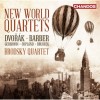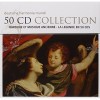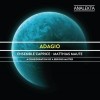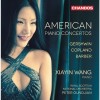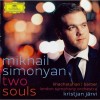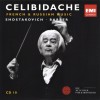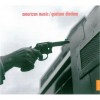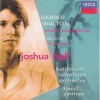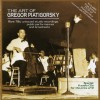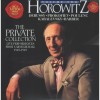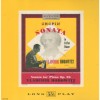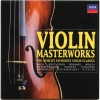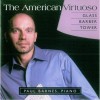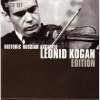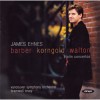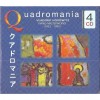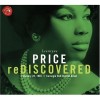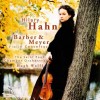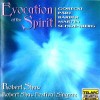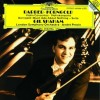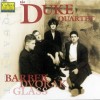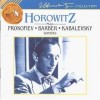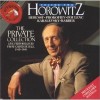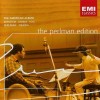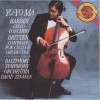Composers
Samuel Osborne Barber II (March 9, 1910 – January 23, 1981) was an American composer of orchestral, opera, choral, and piano music. His Adagio for Strings is his most popular composition and widely considered a masterpiece of modern classical music. He was twice awarded the Pulitzer Prize for music, for his opera Vanessa and his Concerto for Piano and Orchestra. His Knoxville: Summer of 1915, a work for soprano and orchestra, was an acclaimed setting of prose by James Agee.
Barber was born in West Chester, Pennsylvania, the son of Marguerite McLeod (née Beatty) and Samuel LeRoy Barber. At a very early age, Barber became profoundly interested in music, and it was apparent that he had great musical talent and ability. At the age of nine he wrote to his mother:
Dear Mother: I have written this to tell you my worrying secret. Now don’t cry when you read it because it is neither yours nor my fault. I suppose I will have to tell it now without any nonsense. To begin with I was not meant to be an athlet [sic]. I was meant to be a composer, and will be I’m sure. I’ll ask you one more thing .—Don’t ask me to try to forget this unpleasant thing and go play football.—Please—Sometimes I’ve been worrying about this so much that it makes me mad (not very).
He wrote his first musical at the early age of 7 and attempted to write his first opera at the age of 10. He was an organist at the age of 12. When he was 14, he entered the Curtis Institute in Philadelphia, where he studied piano, composition, and voice.
Barber was born into a comfortable, educated, social, and distinguished Irish-American family. His father was a physician, and his mother was a pianist. His aunt, Louise Homer, was a leading contralto at the Metropolitan Opera and his uncle, Sidney Homer, was a composer of American art songs. Louise Homer is known to have influenced Barber's interest in voice. Through his aunt, Barber had access to many great singers and songs.
Barber began composing seriously in his late teenage years. Around the same time, he met fellow Curtis schoolmate Gian Carlo Menotti, who became his partner in life as well as in their shared profession. At the Curtis Institute, Barber was a triple prodigy in composition, voice, and piano. He soon became a favorite of the conservatory's founder, Mary Louise Curtis Bok. It was through Mrs. Bok that Barber was introduced to his lifelong publisher, the Schirmer family. At the age of 18, Barber won the Joseph H. Bearns Prize from Columbia University for his Violin Sonata (now lost or destroyed by the composer).
From his early to late twenties, Barber wrote a flurry of successful compositions, launching him into the spotlight of the classical music world. Many of his compositions were commissioned or first performed by such famous artists as Vladimir Horowitz, Eleanor Steber, Raya Garbousova, John Browning, Leontyne Price, Pierre Bernac, Francis Poulenc, and Dietrich Fischer-Dieskau. When Barber was 28, his Adagio for Strings was performed by the NBC Symphony Orchestra under the direction of Arturo Toscanini in 1938, along with his first Essay for Orchestra. The Adagio had been arranged from the slow movement of Barber's String Quartet, Op. 11. Toscanini had only rarely performed music by American composers before (an exception was Howard Hanson's Second Symphony, which he conducted in 1933). At the end of the first rehearsal of the piece, Toscanini remarked, "Semplice e bella" (simple and beautiful).
Barber served in the Army Air Corps in World War II, where he was commissioned to write his Second Symphony, a work he later suppressed. (It was released in a "Vox" recording by the New Zealand Symphony Orchestra conducted by Andrew Schenck). Composed in 1943, the symphony was originally titled Symphony Dedicated to the Air Forces and was premiered in early 1944 by Serge Koussevitsky and the Boston Symphony Orchestra. Barber revised the symphony in 1947, which was published by G. Schirmer, and recorded the following year by the New Symphony Orchestra of London conducted by the composer, but Barber subsequently destroyed the score in 1964. It was reconstructed from the instrumental parts. According to another source, however, it was precisely the parts to the symphony that Barber had torn up. Hans Heinsheimer was an eyewitness, and reported that he accompanied Barber to the publisher's office where they collected all the music from the library and Barber "tore up all these beautifully and expensively copied materials with his own hands" Doubt has been cast on this story, however, on grounds that Heinsheimer, as an executive at G. Schirmer, would have allowed Barber into the Schirmer offices to watch him "rip apart the music that his company had invested money in publishing".
Barber won the Pulitzer Prize twice: in 1958 for his first opera Vanessa, and in 1963 for his Concerto for Piano and Orchestra.
Barber spent many years in isolation after the harsh rejection of his third opera Antony and Cleopatra. He was eventually diagnosed with clinical depression, and was also beset by alcoholism. The opera was written for and premiered at the opening of the new Metropolitan Opera House on 16 September 1966. After this setback, Barber continued to write music until he was almost 70 years old. Barber's music in his later years would be lauded as reflective and contemplative, but without the morbidity or unhappiness of other composers who knew they had a limited time to live. The Third Essay for Orchestra (1978) was his last major work. In the general view of critics it had all the vigor and imagination of his earlier works.
Barber was the recipient of numerous awards and prizes including the Rome Prize (the American version of the Prix de Rome), two Pulitzers, and election to the American Academy of Arts and Letters. He was elected a Fellow of the American Academy of Arts and Sciences in 1961.
Barber was initiated, as a full collegiate member, into the Zeta Iota chapter of Phi Mu Alpha Sinfonia music fraternity at Howard University in 1952.
In addition to composing, Barber was active in organizations that sought to help musicians and music. He was president of the International Music Council of UNESCO, where he did much to bring into focus and ameliorate the conditions of international musical problems. One of the first American composers to visit Russia (which was then a constituent republic of the Soviet Union), Barber was influential also in the successful campaign of composers against ASCAP, helping composers increase the share of royalties they receive from their compositions.
Barber played and studied the music of Johann Sebastian Bach and was an adherent of Johannes Brahms, from whom he learned how to compress profound emotions into small modules of highly charged musical expression (Cello Sonata, 1932).
In 1933, after reading the poem "Prometheus Unbound" by Percy Bysshe Shelley, Barber composed the tone poem Music for a Scene from Shelley, Op. 7. In 1935, when the work was premiered at Carnegie Hall, it was the first time the composer heard one of his orchestral works performed publicly.
Barber's compositional style has been lauded for its musical logic, sense of architectural design, effortless melodic gift, and direct emotional appeal. This was evident in the Overture to The School for Scandal (1931) and Music for a Scene from Shelley (1933). These were characteristics of his music throughout his lifetime.
Through the success of his Overture to The School for Scandal (1931), Music for a Scene from Shelley (1933), Adagio for Strings (1938); (First) Symphony in One Movement (1936), (First) Essay for Orchestra (1937) and Violin Concerto (1939), Barber garnered performances by the world's leading conductors — Eugene Ormandy, Dimitri Mitropoulos, Bruno Walter, Charles Münch, George Szell, Artur Rodziński, Leopold Stokowski, and Thomas Schippers.
His compositions later included polytonality (Second Symphony, 1944); atonality (Medea, 1946, Prayers of Kierkegaard, 1954); Twelve-tone technique (Nocturne, 1959 and the Piano Sonata, 1949); and jazz (Excursions, 1944; and A Hand of Bridge, 1959).
Among his finest works are his four concertos, one each for Violin (1939), Cello (1945) and Piano (1962), and also the neoclassical Capricorn Concerto for flute, oboe, trumpet and string orchestra. All of these works are rewarding for the soloists and public alike, as all contain both highly virtuosic and beautiful writing, often simultaneously. The latter three have been unfairly neglected until recent years, when there has been a reawakening of interest in the expressive possibilities of these masterpieces.
Barber's final opus was the Canzonetta for oboe and string orchestra (1979/1981).
The four piano "bagatelles" Excursions, Op. 20, (1942–44), was his first and only venture into Americana music. Its elements of boogie-woogie, blues, theme and variations on a cowboy song, and hoedown are not typical of Barber's generally more classical style. In 1949, Barber wrote his keyboard masterpiece Piano Sonata, which has maintained a prominent position in the concert repertoire since its premiere. The Nocturne for Piano (Homage to John Field), Op. 33, is another respected piece which he composed for the instrument.
Barber's life partner Gian Carlo Menotti, whom he had met at Curtis, supplied the libretto (text) for Barber's opera, Vanessa. Using his vocal training, in 1956 Barber played and sang the score to the Metropolitan Opera's General Manager, Rudolf Bing, who accepted the work. It premiered in January 1958. The title role was written for Sena Jurinac but she cancelled six weeks before the opening, to be replaced by Eleanor Steber, with whom the role has become closely identified. Vanessa won the 1958 Pulitzer Prize and gained acclaim as the first American grand opera.
Menotti also contributed the libretto for Barber's chamber opera A Hand of Bridge. Barber's Antony and Cleopatra was commissioned to open the new Metropolitan Opera House at Lincoln Center in 1966. The elaborate production designed by Franco Zeffirelli was plagued with technical disasters; it also overwhelmed and obscured Barber's music, which most critics derided as uncharacteristically weak and unoriginal. The critical rejection of music that Barber considered to be among his best sent him into a deep depression. In recent years, a revised version of Antony and Cleopatra, for which Menotti provided collaborative assistance, has enjoyed some success.
Barber's background, deeply rooted in singing (including studies with Emilio de Gogorza), his love of poetry, and his intimate knowledge and appreciation of the human voice, inspired his vocal writing. Barber's most famous vocal compositions, Knoxville: Summer of 1915 (to words by James Agee) and Dover Beach (to the poem by Matthew Arnold), were greatly successful. Their critical acclaim has made a powerful case for Barber as one of the twentieth century's most accomplished composers for the voice.
In honor of Barber's influence on American music, on October 19, 1974, he was awarded the prestigious University of Pennsylvania Glee Club Award of Merit. This award was established in 1964 "to bring a declaration of appreciation to an individual each year who has made a significant contribution to the world of music and helped to create a climate in which our talents may find valid expression."
In September 1992, soprano Cheryl Studer, baritone Thomas Hampson, the preeminent Samuel Barber pianist John Browning and the Emerson String Quartet recorded the complete songs of Samuel Barber (with the exception of Knoxville: Summer of 1915) at the Brahms-Saal of the famous Musikverein in Vienna, Austria. The Deutsche Grammophon (catalogue 435 867-2) set has become a classic of American song on record.
In 1939 Philadelphia industrialist Samuel Simeon Fels commissioned Barber to write a violin concerto for Fels' ward, Iso Briselli, a graduate from the Curtis Institute of Music the same year as Barber, 1934. The Barber biographies written by Nathan Broder (1954) and Barbara B. Heyman (1992) discuss the genesis of the concerto during the period of the violin concerto's commission and subsequent year leading up to the first performance. Heyman interviewed Briselli and others familiar with the history in her publication. In late 2010, previously unpublished letters written by Fels, Barber, and Albert Meiff (Briselli's violin coach in that period) from the Samuel Simeon Fels Papers archived at the Historical Society of Pennsylvania became available to the public.
Adagio for Strings is a string-orchestra version of the slow movement from Barber's only string quartet, in response to a commission by Italian conductor, Arturo Toscanini. It was broadcast as part of a radio tribute following the death of US president, Franklin D. Roosevelt and at the funeral of Princess Grace of Monaco. It was used by French film composer, Georges Delerue, as part of his score, in the opening and various other passages of Platoon (1986), a film directed by Oliver Stone about the Vietnam War. It is the soundtrack of the movie The Elephant Man (1980) directed by David Lynch. During its depiction of the final moments of Merrick's (The Elephant Man) life, the film uses "Adagio for Strings". It has also been remixed quite popularly by electronic dance artist DJ Tiesto and a choral version served as the theme to the real-time strategy game Homeworld. Barber's choral arrangement, setting the text of the "Agnus Dei" from the Catholic mass ordinary, was used in the film, Lorenzo's Oil, starring Nick Nolte and Susan Sarandon.
Recently Added
| Country: | United States Of America |
| Period: | XX age |
Biography
Samuel Osborne Barber II (March 9, 1910 – January 23, 1981) was an American composer of orchestral, opera, choral, and piano music. His Adagio for Strings is his most popular composition and widely considered a masterpiece of modern classical music. He was twice awarded the Pulitzer Prize for music, for his opera Vanessa and his Concerto for Piano and Orchestra. His Knoxville: Summer of 1915, a work for soprano and orchestra, was an acclaimed setting of prose by James Agee.
Barber was born in West Chester, Pennsylvania, the son of Marguerite McLeod (née Beatty) and Samuel LeRoy Barber. At a very early age, Barber became profoundly interested in music, and it was apparent that he had great musical talent and ability. At the age of nine he wrote to his mother:
Dear Mother: I have written this to tell you my worrying secret. Now don’t cry when you read it because it is neither yours nor my fault. I suppose I will have to tell it now without any nonsense. To begin with I was not meant to be an athlet [sic]. I was meant to be a composer, and will be I’m sure. I’ll ask you one more thing .—Don’t ask me to try to forget this unpleasant thing and go play football.—Please—Sometimes I’ve been worrying about this so much that it makes me mad (not very).
He wrote his first musical at the early age of 7 and attempted to write his first opera at the age of 10. He was an organist at the age of 12. When he was 14, he entered the Curtis Institute in Philadelphia, where he studied piano, composition, and voice.
Barber was born into a comfortable, educated, social, and distinguished Irish-American family. His father was a physician, and his mother was a pianist. His aunt, Louise Homer, was a leading contralto at the Metropolitan Opera and his uncle, Sidney Homer, was a composer of American art songs. Louise Homer is known to have influenced Barber's interest in voice. Through his aunt, Barber had access to many great singers and songs.
Barber began composing seriously in his late teenage years. Around the same time, he met fellow Curtis schoolmate Gian Carlo Menotti, who became his partner in life as well as in their shared profession. At the Curtis Institute, Barber was a triple prodigy in composition, voice, and piano. He soon became a favorite of the conservatory's founder, Mary Louise Curtis Bok. It was through Mrs. Bok that Barber was introduced to his lifelong publisher, the Schirmer family. At the age of 18, Barber won the Joseph H. Bearns Prize from Columbia University for his Violin Sonata (now lost or destroyed by the composer).
From his early to late twenties, Barber wrote a flurry of successful compositions, launching him into the spotlight of the classical music world. Many of his compositions were commissioned or first performed by such famous artists as Vladimir Horowitz, Eleanor Steber, Raya Garbousova, John Browning, Leontyne Price, Pierre Bernac, Francis Poulenc, and Dietrich Fischer-Dieskau. When Barber was 28, his Adagio for Strings was performed by the NBC Symphony Orchestra under the direction of Arturo Toscanini in 1938, along with his first Essay for Orchestra. The Adagio had been arranged from the slow movement of Barber's String Quartet, Op. 11. Toscanini had only rarely performed music by American composers before (an exception was Howard Hanson's Second Symphony, which he conducted in 1933). At the end of the first rehearsal of the piece, Toscanini remarked, "Semplice e bella" (simple and beautiful).
Barber served in the Army Air Corps in World War II, where he was commissioned to write his Second Symphony, a work he later suppressed. (It was released in a "Vox" recording by the New Zealand Symphony Orchestra conducted by Andrew Schenck). Composed in 1943, the symphony was originally titled Symphony Dedicated to the Air Forces and was premiered in early 1944 by Serge Koussevitsky and the Boston Symphony Orchestra. Barber revised the symphony in 1947, which was published by G. Schirmer, and recorded the following year by the New Symphony Orchestra of London conducted by the composer, but Barber subsequently destroyed the score in 1964. It was reconstructed from the instrumental parts. According to another source, however, it was precisely the parts to the symphony that Barber had torn up. Hans Heinsheimer was an eyewitness, and reported that he accompanied Barber to the publisher's office where they collected all the music from the library and Barber "tore up all these beautifully and expensively copied materials with his own hands" Doubt has been cast on this story, however, on grounds that Heinsheimer, as an executive at G. Schirmer, would have allowed Barber into the Schirmer offices to watch him "rip apart the music that his company had invested money in publishing".
Barber won the Pulitzer Prize twice: in 1958 for his first opera Vanessa, and in 1963 for his Concerto for Piano and Orchestra.
Barber spent many years in isolation after the harsh rejection of his third opera Antony and Cleopatra. He was eventually diagnosed with clinical depression, and was also beset by alcoholism. The opera was written for and premiered at the opening of the new Metropolitan Opera House on 16 September 1966. After this setback, Barber continued to write music until he was almost 70 years old. Barber's music in his later years would be lauded as reflective and contemplative, but without the morbidity or unhappiness of other composers who knew they had a limited time to live. The Third Essay for Orchestra (1978) was his last major work. In the general view of critics it had all the vigor and imagination of his earlier works.
Barber was the recipient of numerous awards and prizes including the Rome Prize (the American version of the Prix de Rome), two Pulitzers, and election to the American Academy of Arts and Letters. He was elected a Fellow of the American Academy of Arts and Sciences in 1961.
Barber was initiated, as a full collegiate member, into the Zeta Iota chapter of Phi Mu Alpha Sinfonia music fraternity at Howard University in 1952.
In addition to composing, Barber was active in organizations that sought to help musicians and music. He was president of the International Music Council of UNESCO, where he did much to bring into focus and ameliorate the conditions of international musical problems. One of the first American composers to visit Russia (which was then a constituent republic of the Soviet Union), Barber was influential also in the successful campaign of composers against ASCAP, helping composers increase the share of royalties they receive from their compositions.
Barber played and studied the music of Johann Sebastian Bach and was an adherent of Johannes Brahms, from whom he learned how to compress profound emotions into small modules of highly charged musical expression (Cello Sonata, 1932).
In 1933, after reading the poem "Prometheus Unbound" by Percy Bysshe Shelley, Barber composed the tone poem Music for a Scene from Shelley, Op. 7. In 1935, when the work was premiered at Carnegie Hall, it was the first time the composer heard one of his orchestral works performed publicly.
Barber's compositional style has been lauded for its musical logic, sense of architectural design, effortless melodic gift, and direct emotional appeal. This was evident in the Overture to The School for Scandal (1931) and Music for a Scene from Shelley (1933). These were characteristics of his music throughout his lifetime.
Through the success of his Overture to The School for Scandal (1931), Music for a Scene from Shelley (1933), Adagio for Strings (1938); (First) Symphony in One Movement (1936), (First) Essay for Orchestra (1937) and Violin Concerto (1939), Barber garnered performances by the world's leading conductors — Eugene Ormandy, Dimitri Mitropoulos, Bruno Walter, Charles Münch, George Szell, Artur Rodziński, Leopold Stokowski, and Thomas Schippers.
His compositions later included polytonality (Second Symphony, 1944); atonality (Medea, 1946, Prayers of Kierkegaard, 1954); Twelve-tone technique (Nocturne, 1959 and the Piano Sonata, 1949); and jazz (Excursions, 1944; and A Hand of Bridge, 1959).
Among his finest works are his four concertos, one each for Violin (1939), Cello (1945) and Piano (1962), and also the neoclassical Capricorn Concerto for flute, oboe, trumpet and string orchestra. All of these works are rewarding for the soloists and public alike, as all contain both highly virtuosic and beautiful writing, often simultaneously. The latter three have been unfairly neglected until recent years, when there has been a reawakening of interest in the expressive possibilities of these masterpieces.
Barber's final opus was the Canzonetta for oboe and string orchestra (1979/1981).
The four piano "bagatelles" Excursions, Op. 20, (1942–44), was his first and only venture into Americana music. Its elements of boogie-woogie, blues, theme and variations on a cowboy song, and hoedown are not typical of Barber's generally more classical style. In 1949, Barber wrote his keyboard masterpiece Piano Sonata, which has maintained a prominent position in the concert repertoire since its premiere. The Nocturne for Piano (Homage to John Field), Op. 33, is another respected piece which he composed for the instrument.
Barber's life partner Gian Carlo Menotti, whom he had met at Curtis, supplied the libretto (text) for Barber's opera, Vanessa. Using his vocal training, in 1956 Barber played and sang the score to the Metropolitan Opera's General Manager, Rudolf Bing, who accepted the work. It premiered in January 1958. The title role was written for Sena Jurinac but she cancelled six weeks before the opening, to be replaced by Eleanor Steber, with whom the role has become closely identified. Vanessa won the 1958 Pulitzer Prize and gained acclaim as the first American grand opera.
Menotti also contributed the libretto for Barber's chamber opera A Hand of Bridge. Barber's Antony and Cleopatra was commissioned to open the new Metropolitan Opera House at Lincoln Center in 1966. The elaborate production designed by Franco Zeffirelli was plagued with technical disasters; it also overwhelmed and obscured Barber's music, which most critics derided as uncharacteristically weak and unoriginal. The critical rejection of music that Barber considered to be among his best sent him into a deep depression. In recent years, a revised version of Antony and Cleopatra, for which Menotti provided collaborative assistance, has enjoyed some success.
Barber's background, deeply rooted in singing (including studies with Emilio de Gogorza), his love of poetry, and his intimate knowledge and appreciation of the human voice, inspired his vocal writing. Barber's most famous vocal compositions, Knoxville: Summer of 1915 (to words by James Agee) and Dover Beach (to the poem by Matthew Arnold), were greatly successful. Their critical acclaim has made a powerful case for Barber as one of the twentieth century's most accomplished composers for the voice.
In honor of Barber's influence on American music, on October 19, 1974, he was awarded the prestigious University of Pennsylvania Glee Club Award of Merit. This award was established in 1964 "to bring a declaration of appreciation to an individual each year who has made a significant contribution to the world of music and helped to create a climate in which our talents may find valid expression."
In September 1992, soprano Cheryl Studer, baritone Thomas Hampson, the preeminent Samuel Barber pianist John Browning and the Emerson String Quartet recorded the complete songs of Samuel Barber (with the exception of Knoxville: Summer of 1915) at the Brahms-Saal of the famous Musikverein in Vienna, Austria. The Deutsche Grammophon (catalogue 435 867-2) set has become a classic of American song on record.
In 1939 Philadelphia industrialist Samuel Simeon Fels commissioned Barber to write a violin concerto for Fels' ward, Iso Briselli, a graduate from the Curtis Institute of Music the same year as Barber, 1934. The Barber biographies written by Nathan Broder (1954) and Barbara B. Heyman (1992) discuss the genesis of the concerto during the period of the violin concerto's commission and subsequent year leading up to the first performance. Heyman interviewed Briselli and others familiar with the history in her publication. In late 2010, previously unpublished letters written by Fels, Barber, and Albert Meiff (Briselli's violin coach in that period) from the Samuel Simeon Fels Papers archived at the Historical Society of Pennsylvania became available to the public.
Adagio for Strings is a string-orchestra version of the slow movement from Barber's only string quartet, in response to a commission by Italian conductor, Arturo Toscanini. It was broadcast as part of a radio tribute following the death of US president, Franklin D. Roosevelt and at the funeral of Princess Grace of Monaco. It was used by French film composer, Georges Delerue, as part of his score, in the opening and various other passages of Platoon (1986), a film directed by Oliver Stone about the Vietnam War. It is the soundtrack of the movie The Elephant Man (1980) directed by David Lynch. During its depiction of the final moments of Merrick's (The Elephant Man) life, the film uses "Adagio for Strings". It has also been remixed quite popularly by electronic dance artist DJ Tiesto and a choral version served as the theme to the real-time strategy game Homeworld. Barber's choral arrangement, setting the text of the "Agnus Dei" from the Catholic mass ordinary, was used in the film, Lorenzo's Oil, starring Nick Nolte and Susan Sarandon.
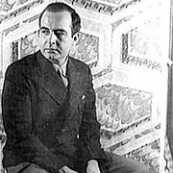
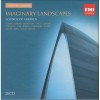
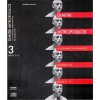
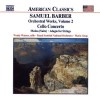
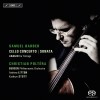
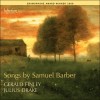
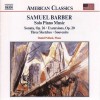
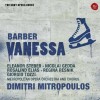
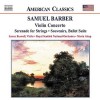
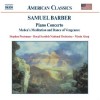
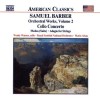
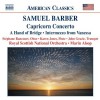


![Russian legends - Leonid Kogan [10 CD]](http://static.classicalm.com/repository/collection-cover/small/269-img1318707830156876.jpg)
![Great European Organs. 60-Adrian Partington [Reading Town Hall]](http://static.classicalm.com/repository/collection-cover/small/959-img1342432096102267.jpg)
